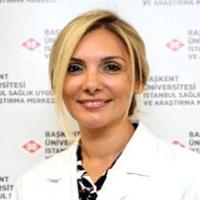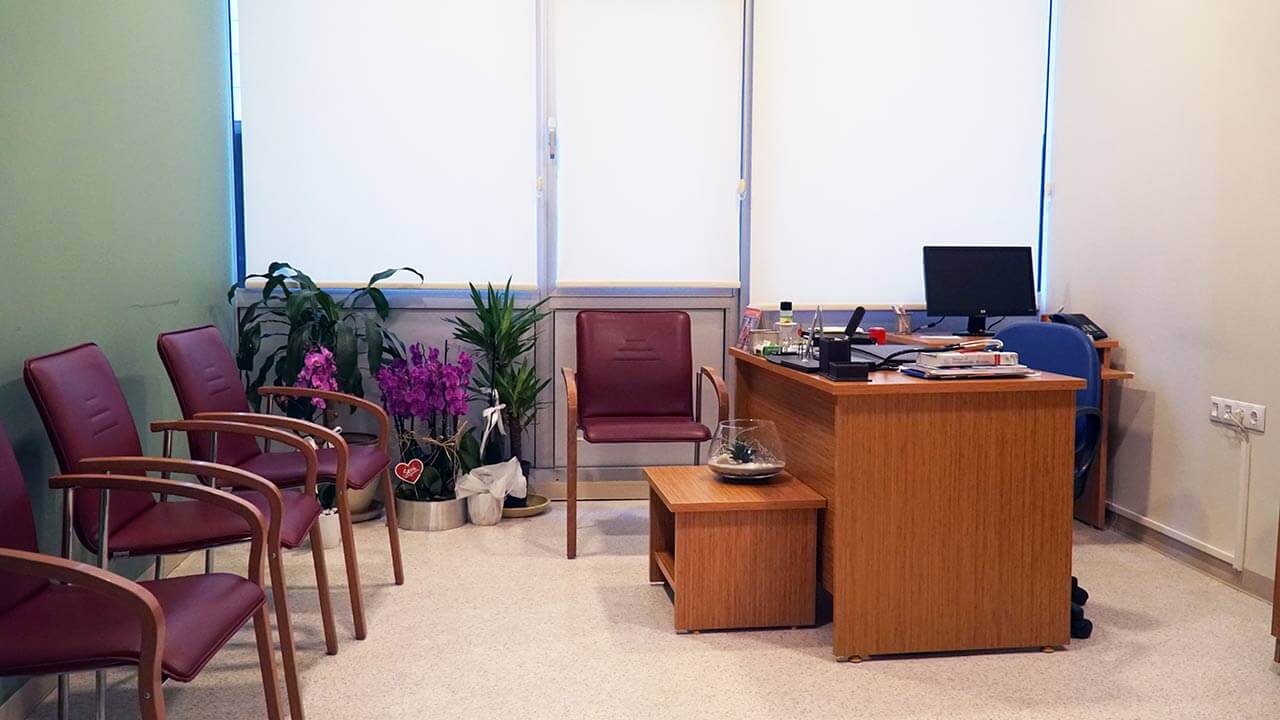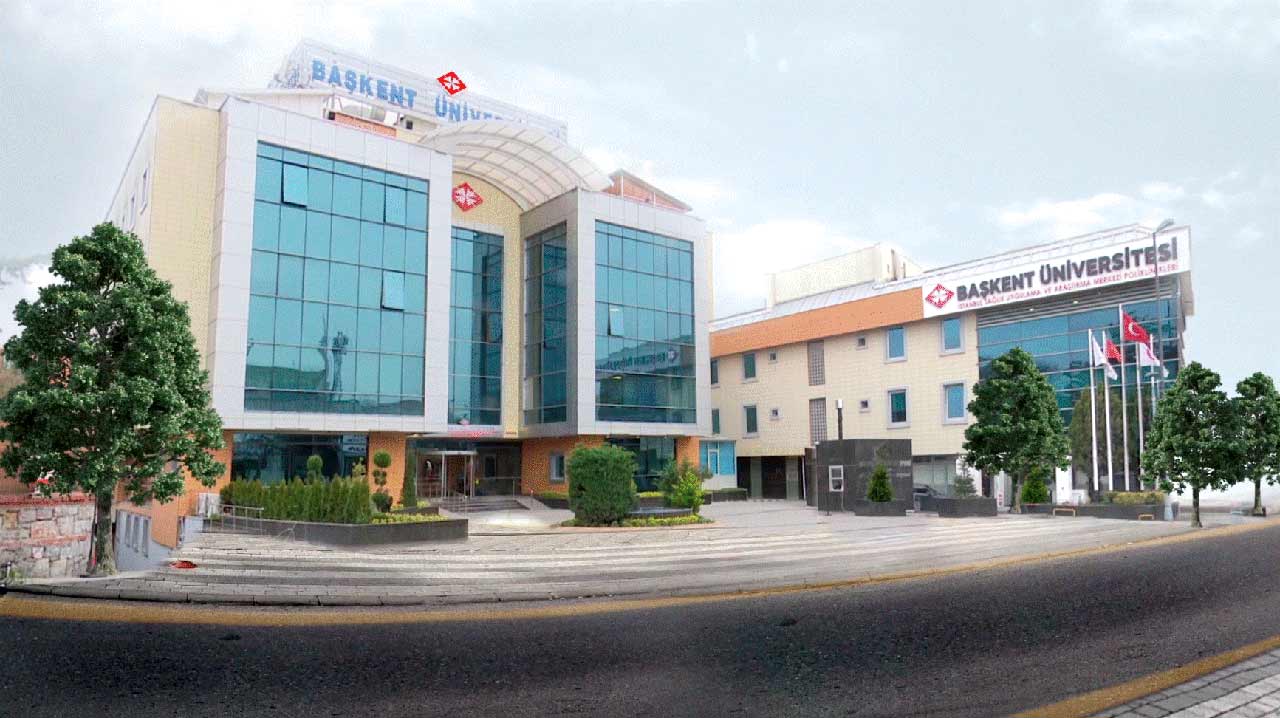
The program includes:
- Initial presentation in the clinic
- clinical history taking
- review of medical records
- physical examination
- laboratory tests:
- complete blood count
- biochemical blood test
- inflammation markers (CRP, ESR)
- blood coagulation analysis (aPTT, PT, INR)
- barium passage
- ultrasound of the abdomen
- gastroscopy (with biopsy if clinically indicated, additional cost is 2500€)
- nursing services
- consultation of related specialists
- treatment by chief physician and all leading experts
- explanation of individual treatment plan
Required documents
- Medical records
- Barium swallow (upper gastrointestinal series) (if available)
- Esophagogastroduodenoscopy (EGD) (if available)
Service
You may also book:
 BookingHealth Price from:
BookingHealth Price from:
About the department
The Department of Adult and Pediatric General, Abdominal, Cancer, Colorectal, Endocrine and Bariatric Surgery at the Baskent University Hospital Istanbul offers the full range of surgical interventions in the areas of its competence. The department's team of surgeons specializes in the surgical treatment of diseases of the gastrointestinal tract, including the liver, pancreas, gallbladder and bile ducts, endocrine glands, as well as pathologies of the anal canal, rectum and colon. In addition, the department performs surgery to treat morbid obesity in patients with a body mass index above 35. The clinical practice is especially focused on the treatment of cancers of the digestive system. Whenever possible, the department's surgeons prefer sparing minimally invasive interventions, after which the patient does not need a long hospital stay. Such surgical procedures exclude any pronounced pain, which reduces the need for pain medications. The Head Physician of the department is Prof. Dr. med. Feza Yarbug Karakayalı.
The specialists in the field of general and abdominal surgery perform surgical treatment of benign and malignant diseases of the stomach, small intestine, esophagus, gallbladder, bile ducts, etc. In addition, the department performs operations to remove the appendix, surgical treatment of inguinal, umbilical and incisional hernias. In most cases, surgeons manage to avoid open surgery and perform the intervention using sparing laparoscopic techniques. Laparoscopic surgery does not require large skin incisions and does not leave any visible scars on the patient's body. When performing minimally invasive surgery, the surgeon makes only a few short incisions, while some surgical procedures can be performed through natural openings in the human body. However, such surgery does not always help achieve all the goals of treatment, and therefore, if clinically indicated, classical open operations are performed.
Gastrointestinal cancer is treated in close cooperation with gastroenterologists, oncologists, chemotherapists, radiation therapists and other experts in related fields. An interdisciplinary approach guarantees effective comprehensive cancer treatment, taking into account all the features of the disease. The specialists jointly think over the tactics of treatment, which aims to completely eliminate the patient from oncology or achieve stable remission in the case of terminal stages of cancer.
The department's scope of tasks includes the surgical treatment of proctological disorders. The doctors mostly deal with the treatment of patients suffering from hemorrhoids, anal fissures, fistulas, chronic constipation, fecal incontinence, rectal prolapse, perianal warts and other pathologies. Prior to the operation, the department's doctors carry out comprehensive diagnostics using rectoscopy, anorectal manometry and various laboratory tests. Only if conservative treatment does not yield results, the patient will be indicated for surgery.
Another important focus of the department's surgical team is the surgical treatment of morbid obesity. The experts make such a diagnosis in patients with a body mass index above 40, or with a BMI of 35 with concomitant diseases. The doctors of the department have extensive experience in the field of bariatric surgery. The department successfully performs such operations as gastric bypass surgery and sleeve gastroplasty. It is obvious that surgery is not a first-line treatment. The patient is initially prescribed conservative measures, which necessarily include diet and exercise. Only in case of ineffectiveness of conservative measures, the doctors have to resort to surgical methods. However, after the operation, the patient also has to follow a proper diet and exercise regularly. Such measures will help to consolidate the result and maintain a normal weight. It should be noted that obesity is a rather dangerous pathological condition, since it often provokes the development of type 2 diabetes mellitus, coronary heart disease, arterial hypertension, heart failure, shortness of breath and other diseases that pose a danger to human life.
The department's range of services is complemented by pediatric surgery. The pediatric surgeons provide treatment to young patients under the age of 16. The surgeons mostly have to deal with surgical procedures to correct congenital anomalies. With appropriate indications, it is possible to perform sparing laparoscopic operations. The department's surgeons easily find a common language with children and make every effort to rid the child of the fear of treatment.
The department's range of surgical services includes:
- General and abdominal surgery
- Surgical treatment of benign diseases of the stomach, small intestine and esophagus
- Surgical treatment of benign diseases of the liver, pancreas, gallbladder, bile ducts
- Surgical treatment of inflammatory bowel disease (Crohn's disease and ulcerative colitis)
- Appendectomy
- Surgical treatment of inguinal, umbilical and incisional hernias
- Cancer surgery
- Surgical treatment of stomach cancer
- Surgical treatment of colorectal cancer
- Surgical treatment of esophageal cancer
- Surgical treatment of liver cancer
- Surgical treatment of pancreatic cancer
- Surgical treatment of gallbladder and bile duct cancers
- Pediatric surgery
- Surgical treatment of esophageal atresia, duodenal atresia, anal atresia
- Surgical treatment of omphalocele
- Surgical treatment of gastroschisis
- Surgical treatment of bladder exstrophy
- Surgical treatment of Hirschsprung's disease
- Surgical hernia repair
- Surgical correction of undescended testicles in boys
- Surgical correction of testicular torsion in boys
- Surgical treatment of hydrocele in boys
- Surgical correction of hypospadias and epispadias in boys
- Surgical treatment of vesicoureteral reflux
- Surgical correction of congenital chest deformities (pectus excavatum and pectus carinatum)
- Surgical treatment of torticollis
- Surgical treatment of cysts and fistulas
- Surgical treatment for benign neoplasms (for example, hemangiomas)
- Surgical treatment of malignant neoplasms of the liver, spleen, kidneys, adrenal glands, stomach, intestines and bladder
- Emergency surgery
- Colorectal surgery
- Surgical treatment of hemorrhoids
- Surgical treatment of anal fissures and fistulas
- Surgical treatment of chronic constipation
- Surgical treatment of fecal incontinence
- Surgical treatment of rectocele
- Surgical treatment of rectal prolapse
- Surgical removal of perianal warts
- Endocrine surgery
- Surgical treatment of nodular goiter
- Surgical treatment of thyroid cancer
- Surgical treatment of parathyroid adenoma and parathyroid cancer
- Surgical treatment of adrenal tumors
- Bariatric surgery
- Surgical treatment of morbid obesity
- Other surgical options
Curriculum vitae
Higher Education and Professional Career
- 1996 Study of Human Medicine, Faculty of Medicine, Çukurova University.
- 1998 Research Assistant, Department of General Surgery, Ankara University.
- 2004 Physician in the Department of General Surgery, University Hospital Baskent.
- 2007 Assistant Professor, Department of General Surgery, Baskent University.
- 2010 Associate Professor, Department of General Surgery, Baskent University.
- 2010 Internship, Department of Colorectal Surgery, Cleveland Clinic, USA.
- 2015 Professor and Head of the Department of Adult and Pediatric General, Abdominal, Cancer, Colorectal, Endocrine and Bariatric Surgery at the Baskent University Hospital Istanbul.
Advanced Training Courses
- Chronic venous insufficiency course.
- Endoscopic surgery course.
- Course on the first aid for burns and burn treatment.
- Single-anastomosis gastric bypass course.
- Laparoscopic colorectal surgery course.
- Minimally invasive solid organ surgery course.
Memberships in Professional Societies
- Turkish Society of General Surgery.
- Turkish Organ Transplant Association.
- International College of Surgeons.
- European Society of Coloproctology.
- Turkish Society of Colon and Rectal Surgery.
- Turkish Society of Vascular Surgery.
- Middle East Society of Organ Transplantation.
- International Pediatric Transplant Association.
Photo of the doctor: (c) Istanbul Başkent Hospital
About hospital
The Baskent University Hospital Istanbul is a progressive medical complex, whose primary purpose is to provide medical care of the highest quality in a pleasant and comfortable environment. The hospital is part of the prestigious Turkish Baskent University Healthcare Group, whose outstanding achievements are known not only nationally, but also in the international medical arena. The medical group was founded by Prof. Dr. med. Mehmet Haberal, who was the first specialist in Turkey who performed kidney transplantation from a living donor. The hospital in Istanbul opened its doors to the first patient on February 23, 2007, and since then has gained a solid reputation among the top medical facilities in Turkey.
The medical complex has a high-tech base both for accurate diagnostics and effective treatment according to international standards. Special attention should be given to the medical staff of the hospital. The hospital employs professors and doctors with colossal clinical experience. They successfully cope even with especially complex clinical cases. Many specialists underwent training in leading medical centers in America and Europe.
The hospital represents almost all branches of modern medicine. The areas of special competence of the hospital are transplant surgery, cardiac surgery, general surgery, urology, otolaryngology and other medical disciplines. The medical complex has the prestigious ISO 9001:2015 certificate, which is awarded only to the hospitals with impeccable quality of medical service.
The hospital has 125 beds for patient hospitalization, including additional beds in Intensive Care Units, Dialysis and Palliative Care Sections. Every year, the hospital admits more than 7,000 inpatients and more than 180,000 outpatients. In addition, the doctors annually perform more than 4,000 surgical interventions of varying degrees of severity in state-of-the-art operating rooms of the hospital. The medical facility admits many patients from foreign countries, which confirms its high credibility at the international level.
Photo: (c) Istanbul Başkent Hospital, (с) depositphotos
Accommodation in hospital
Patients rooms
The patients of the Baskent University Hospital Istanbul live in comfortable rooms with modern design. All patient rooms are made in light colors and have an ensuite bathroom with shower and toilet. The standard patient room furnishings include an automatically adjustable bed, a bedside table, a wardrobe for clothes, a table and chairs for receiving visitors, as well as a telephone and a TV.
Meals and Menus
The patient and the accompanying person are offered a daily choice of three menus. If you are on a specific diet for any reason, you will be offered an individual menu. Please inform the medical staff about your dietary preferences prior to the treatment.
Further details
Standard rooms include:
Accompanying person
During the inpatient program, an accompanying person may stay with the patient in the room or at a hotel. Our managers will help you choose the most suitable option.
Hotel
During the outpatient program, the patient may stay at the hotel. Our managers will help you choose the most suitable option.






